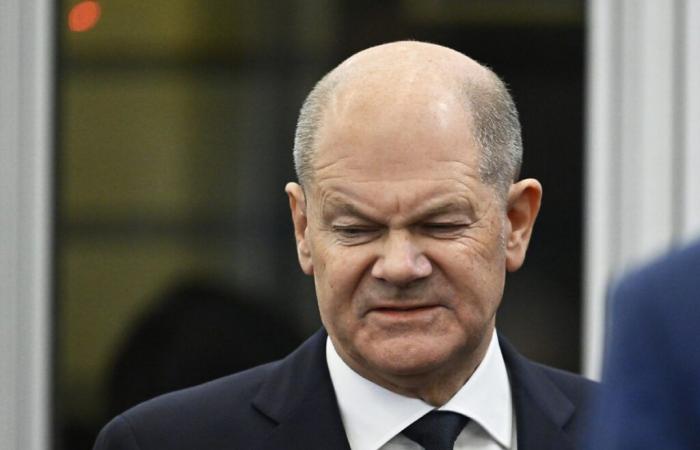Keystone-SDA
Videos on social networks, declarations of candidacy: Germany entered the electoral campaign after the fall of Olaf Scholz’s coalition, even if the chancellor still resists calls to organize rapid early elections.
This content was published on
November 08, 2024 – 1.53pm
(Keystone-ATS) According to a poll published Friday, two-thirds of Germans aspire to new elections without delay, reinforcing the opposition which is increasing calls in this direction.
And 59% of people questioned by the Infratest Dimap institute survey say they are satisfied with the implosion of the very unpopular coalition between the chancellor’s social democrats, the Greens and the liberals of the FDP, which has ruled the country since the end of 2021 .
“Chancellor, give way!” », writes the editor-in-chief of Bild, the most widely read newspaper in Germany.
On the front page, she addresses the Social Democratic leader directly: “I think you really think that you are the only one who can lead Germany. You might even be right. Only we Germans have not believed that for a long time. It’s not Bild that says it, it’s every damn poll since April 2022.”
Olaf Scholz has not spoken on the subject since his statement on Wednesday evening announcing on the one hand the dismissal of liberal Finance Minister Christian Lindner, due to deep disagreements over the country’s economic policy, and on the other hand his intention to ask the question of confidence in mid-January, with a view to early elections in March.
He also carefully avoided mentioning the crisis during a statement on Friday before the summit of European Union leaders in Budapest.
Accelerate
Meanwhile, the pot is boiling in Germany where the parties are positioning themselves for the upcoming election. At the forefront, the leader of the CDU conservatives, Friedrich Merz, omnipresent in the media.
“Let Scholz ask the question of confidence next week,” said the 68-year-old leader, who would have a good chance of becoming chancellor in the event of elections.
A speech by Olaf Scholz scheduled for next Wednesday to Bundestag MPs could be a good opportunity, he suggested, which Scholz spokeswoman Christiane Hoffmann ruled out on Friday.
“Serious democratic processes take time. A fair democratic election has rules and deadlines that we must respect,” argued SPD MP Dirk Wiese during a session in the Bundestag.
Polls credit the CDU and its Bavarian ally CSU with some 34% of the vote, ahead of the far-right Alternative for Germany (AfD).
If Olaf Scholz does not receive the majority of votes in the vote of confidence, which seems inevitable, President Frank-Walter Steinmeier will have 21 days to dissolve the Bundestag and new elections must take place no later than 60 days later.
“Not very responsible”
Christian Lindner, whose FDP has now joined the opposition camp, continues to settle scores with the chancellor, deeming his desire to wait until January “unresponsible”.
While his party is flirting with 5% in the polls, he said he wanted to “resume (his) job as federal Minister of Finance after the next federal election.”
On the side of the Greens, Scholz’s only remaining ally, preparations are also going well. Vice-Chancellor and Minister of the Economy Robert Habeck indirectly announced his entry into the running via a video posted on his X account, reactivated for the occasion after approximately five years of absence.
He is seen reading a document. On his wrist is a bracelet inscribed “Kanzler Era” (“the era of the chancellor”).
“A self-proclamation as a candidate for chancellor with 9% voting intentions does not lack humor,” quipped Friedrich Merz to the environmental leader.
But the leader of the conservatives must also expect a very complicated coalition formation in the event of victory in the elections, because he rejects any alliance with the AfD (around 17-18%). The SPD (16%), the Greens, and possibly the FDP will remain as possible allies.
Even Elon Musk, the controversial boss of the X platform, close to Donald Trump, interfered in the national political debate, calling Olaf Scholz “crazy” in a message in German on his social network.






